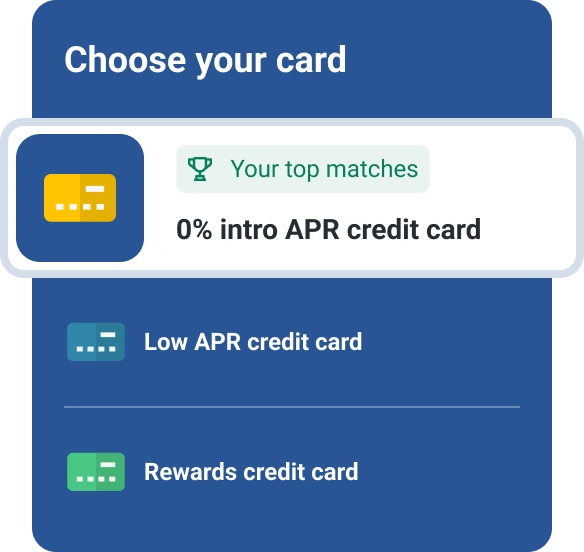Should You Get a Credit Card From Your Bank?

It seems like everywhere you look these days, there are credit card offers just waiting to be taken advantage of. Perhaps you've received mailers with credit offers for cards that have generous sign-up bonuses and low interest rates. Or maybe you saw banners for a new card when you last stopped by your bank branch. If you're wondering whether you should get a credit card from your bank, there are a lot of great reasons to do so. There are also some drawbacks, however, that might have you looking at cards from other issuers. You should consider welcome bonuses, financing terms, whether you'd be able to earn rewards and a few other factors as you make your decision.
Is It Easier to Be Approved for a Credit Card From Your Bank?
One of the main reasons you might want to weigh the credit card offers from your regular bank is that you already have a financial relationship with them. That might even make it easier to get approved.
If you've been a regular and reliable customer of the same bank for a long stretch of time, and your accounts are in good standing, the bank may be more inclined to extend you a new line of credit than an institution you've never worked with before. Not only that, but if you maintain a healthy balance in your account and have a solid record of paying any fees or charges that come due, your bank might take all that into account in addition to the usual factors that determine your credit score. This can be especially useful if you don't have a great credit score but do keep your bank accounts up to date.
Depending on how creditworthy your bank deems you, you might be able to secure favorable interest rates, longer promotional periods for introductory financing (like 0% APR on purchases or balance transfers) and lower fees.
Pros and Cons of Getting a Credit Card From Your Bank
As you consider whether to apply for a credit card from your bank versus another issuer, look at the benefits and disadvantages of doing so.
First, the pros of getting a credit card from your bank:
- Ease of applying: You might find it easier and more convenient to apply online while logged in to your bank account, or even in person at a bank branch if you want to talk to a customer service representative about your options. Doing so might also be a good idea because a bank rep might be able to tell you your odds of being approved.
- Convenience: If you already have one or more accounts with your bank, then setting up a new credit card and adding it to your online profile is simple. You'll already be familiar with your banking app or website and won't have to get used to anything new. It may also make processing your monthly payments faster than establishing a payment system with another entity.
- Having an alternative to a debit card: Perhaps you have a debit card linked to your bank account that you use for withdrawing cash and making purchases. Instead of doing this, however, it's a good idea to open a credit card you can use for purchases since credit cards tend to have better fraud protection in case your card is lost, stolen or used for unauthorized charges.
- Potential for generous bonuses: You may qualify for higher benefits depending on your relationship with your bank. For instance, Bank of America Preferred Rewards members can boost their reward rate on Bank of America credit cards by 25%, 50% or 75% depending on their Preferred Rewards tier, which is determined by their qualifying combined account balance.
Now for some of the cons of getting a credit card from your bank:
- Limited options: By sticking with a single bank, you're cutting yourself off from potentially great welcome offers and rewards from other credit card issuers.
- Reduced bonuses: Before you open a new credit card from your bank, compare the welcome bonus currently being offered with those that have been posted in the past. You might also get a better deal applying in-branch instead of via an offer that is mailed or emailed. Shop around before you hit that apply button.
- No balance transfers: If you already carry a credit card from your bank and want to open a second, you will not be able to take advantage of any promotional balance transfer options like you might with a card from another issuer.
What to Consider When Getting a New Credit Card
There are several other important factors to consider, whether you end up applying for a new credit card from your own bank with a new credit card issuer.
- Whether you qualify for a specific card: Before you submit a credit application, make sure you can qualify for any new credit card you're thinking about opening and that your credit score is within the normal range for applicants. You can review your credit report and FICO® ScoreΘ with a free Experian Basic membership.
- Apply for a worthwhile bonus: A common reason one may apply for a specific credit card at a specific moment is to secure a lucrative welcome bonus that provides more points or better introductory financing than usual. Try to time your application for when the card's welcome offer is as high as possible and for when you can meet any spending or other requirements responsibly.
- Earn the rewards you want: It's also important to think about whether you want a credit card that earns rewards, and if so, what type of rewards it racks up. Perhaps you'd get the most value from cash back that can shave a few dollars off your monthly statement. On the other hand, you might prefer points you can redeem for travel, or airline miles that nab you award flights. Whatever your end goal, make sure the rewards you earn can help you achieve it.
- Features and benefits to look out for: Focus on credit cards that include perks you will use. With an airline credit card, for example, look for benefits like free checked bags and priority boarding. Or try to find a card that earns bonus cash back on specific categories, such as groceries or gas, where you tend to spend the most money each month. Finally, look at a card's purchase and travel protections to make sure you will be covered if something goes wrong with items you buy or you run into unexpected trouble on a trip.
- Annual fees and interest rates: Many credit cards charge annual fees. If you're considering a card that does, make sure you can afford it and that you get more value from the card's benefits each year than it costs to keep it open. Likewise, if you think you might end up carrying a balance, make sure your card's interest and late charges won't be so exorbitant that it sets you back financially.
How to Make Your Credit Card Work for You
Credit cards are handy tools for making purchases and earning rewards, but only as long as you use them responsibly so you can build your credit rather than hurt it. You can do so by taking the following steps.
- Pay on time. Your payment history has a huge influence on your credit score, and making even just one late payment can bring your score down, not to mention potentially triggering late fees, interest charges and other penalties. So always be sure to pay your statement on time (and in full, if possible) every month.
- Pay more than the minimum amount. Most credit cards require you to pay at least a minimum amount each month to avoid late fees. More than that, though, you should try to pay as much of your statement balance as possible so you don't start carrying a large balance that accrues interest. High credit card balances will also raise your credit utilization ratio—the amount of credit you have available versus the amount you are using—which can in turn bring down your credit score.
- Use your card for everyday purchases. If you carry a card that earns rewards, you can maximize your earning by using it for most of your purchases, especially in any bonus categories it might offer. That said, only do so if you're able to pay off your balance on time and in full every month. Otherwise, interest and late fees will wipe out the value of any rewards you earn.
Getting a credit card from your bank can be a great way to continue building your financial profile and credit history as well as earning valuable rewards. It can also be easier to qualify for a credit card from an issuer you already have a good relationship with. That said, you might want to look beyond your own bank to get cards with the best intro bonuses that earn the types of rewards that will be of most use to you. For personalized offers, check out Experian's credit card comparison tool.
Don’t apply blindly
Apply for credit cards confidently with personalized offers based on your credit profile. Get started with your FICO® Score for free.
See your offersAbout the author
Eric Rosen covers credit cards, loyalty programs, the aviation industry and hotels. In addition to Experian, Eric contributes to Bloomberg, Forbes, Business Insider, Travel + Leisure and Condé Nast Traveler on a variety of topics ranging from frequent-flier miles and business-class amenities to rain forest spas and reef-safe sunscreens.
Read more from Eric

